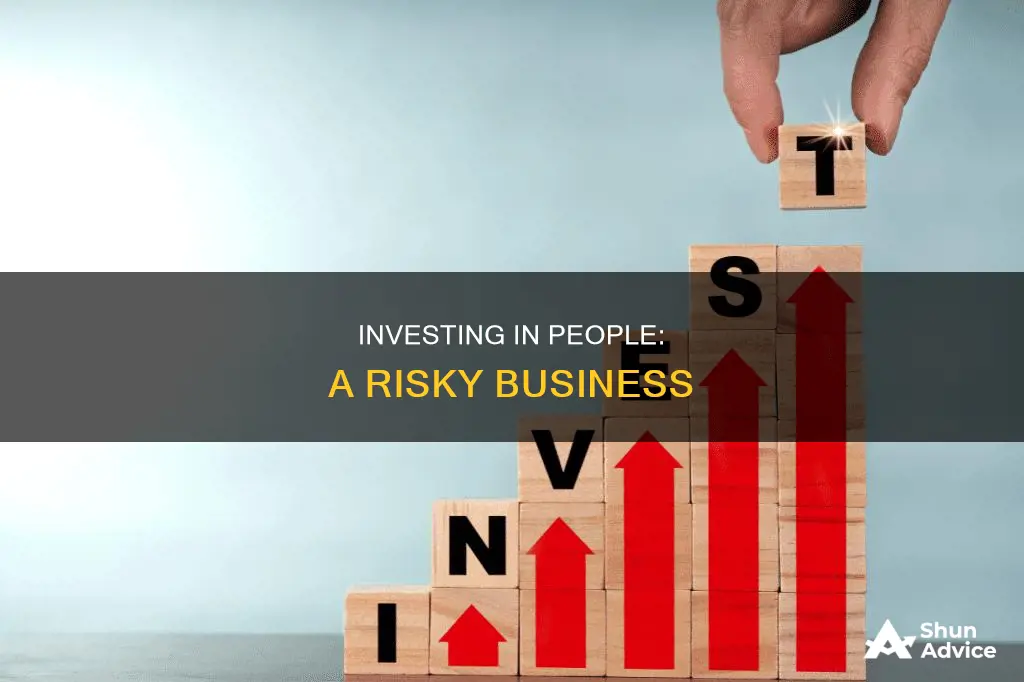
There are many reasons why people choose not to invest their money. Some believe that they will be provided for in retirement by their superannuation or welfare state. Others feel that they do not have enough money to invest, or that they need to pay off debt first. Some people are put off by the risk involved in investing, or find the process intimidating. However, investing is not just for the wealthy—it is a way for anyone to achieve their financial goals.
| Characteristics | Values |
|---|---|
| Fear of Taking Losses | People fear losing their investments. |
| Lack of Knowledge | Many people don't know how to invest. |
| Lack of Funds | Some believe they don't have enough money to invest. |
| Fear of Missing Out | People are afraid of missing out on things they want today if they save for tomorrow. |
| Fear of Risk | Investing is seen as too risky due to market volatility. |
| Intimidation | The concept of investing is intimidating for beginners. |
| Timing the Market | People delay investing, thinking the market is too high or waiting for stock prices to drop. |
| Misconceptions | There are misconceptions about investing, such as the belief that investing is only for the wealthy. |
| Self-Identity | People who don't see themselves as investors are less likely to invest. |
| Interest | Investing requires an interest in being directly involved in reaching financial goals. |
What You'll Learn

Fear of taking losses
Loss Aversion
Loss aversion is a cognitive bias where individuals perceive potential or real losses to be more psychologically and emotionally severe than equivalent gains. In other words, the pain of losing $100 is often far greater than the joy of finding the same amount. This bias is thought to have evolved as a survival mechanism, helping early humans stay alive by avoiding threats and dangers. However, in the modern era, this bias can hinder investors by causing them to make irrational decisions.
Impact on Investment Decisions
The fear of taking losses can lead to several negative outcomes for investors. Firstly, it may cause investors to be overly conservative, investing primarily in "safe" assets like bonds and cash instead of riskier but potentially more lucrative stocks. This can result in lower returns over the long term, especially for investors with a long investment horizon until retirement.
Secondly, loss aversion can cause investors to hold onto losing investments for too long, hoping for a bounce-back that may never come. This is known as the disposition effect, where investors experience more extreme emotional responses to losses than gains. It can also lead to the opposite behaviour, where investors sell winning stocks too soon for fear of losing their gains.
Additionally, this fear can cause some individuals to avoid investing altogether, especially during periods of market downturn when the risk of loss seems higher. However, counterintuitively, these periods often present better investment opportunities than when stock prices are high.
Overcoming the Fear
So, how can investors overcome their fear of taking losses? Here are some strategies:
- Knowledge and Education: Understanding how markets and stocks work can help alleviate fear. Educate yourself about the economy, investors, businesses, and government influences on the market.
- Goal Setting: Identify your financial goals across different time spans (short-term, long-term, etc.) and develop a strategy to achieve them. This helps you stay focused and motivated, overpowering fear with determination.
- Risk Assessment: Analyze your risk tolerance to determine how much loss you are comfortable with, and tailor your investment approach accordingly. Don't invest more than you can afford to lose.
- Start Small: Begin with small investments that you can afford to lose while you learn the ropes and become more comfortable with investing.
- Strategic Asset Allocation: Follow a strategic asset allocation strategy rather than trying to time the market. Periodically rebalance your portfolio according to a rules-based methodology.
- Diversification: Build a diversified portfolio to mitigate market risk. This can include investing in mutual funds, ETFs, or using buy-and-hold strategies.
- Long-Term Perspective: Remember that investing is often a marathon, not a sprint. Don't make impulsive decisions based on short-term market fluctuations.
Theft of Investments: A Growing Concern
You may want to see also

Lack of knowledge
A lack of knowledge is a significant reason why many people choose not to invest. The world of finance can be confusing and intimidating, and it seems that many parents and educational institutions do not provide adequate financial education. As a result, people may not understand the need or value of investing, and it can be challenging to discern credible and reliable financial advice from sales pitches. This lack of knowledge can lead to a lack of belief in one's ability to achieve financial freedom. Negative thoughts such as "I'm not good with money" or "I'm not smart enough to invest" can hold people back from even trying.
However, it is important to remember that investing is not just for the wealthy. Anyone can work towards achieving their financial goals through investing. Overcoming self-limiting beliefs is crucial, and reframing these thoughts can help. For example, instead of thinking "I'm not good with money," consider "I need to learn money management techniques." This simple change in perspective can make a big difference.
To gain the knowledge and confidence needed to start investing, it is essential to educate yourself. Reading books about personal finance and money management is a great first step. These books can provide valuable insights and help you understand the different investment options available. By gaining a basic understanding of investment strategies, you can start working towards financial freedom.
Additionally, seeking advice from a registered financial expert or a financial planner can be beneficial. They can provide personalized recommendations and help you set financial goals. With their expertise, you can navigate the complex world of finance and make informed decisions about your investments.
In conclusion, while a lack of knowledge may initially deter people from investing, it is certainly possible to overcome this obstacle. By educating yourself, seeking expert advice, and reframing negative thoughts, you can take control of your financial future and work towards achieving your financial goals.
Forging Checks: A Risky Investment Gamble
You may want to see also

Fear of missing out
FOMO, or the fear of missing out, is a common form of social anxiety. It is the feeling of being compelled to keep up with one's peers, often due to the fear of being left out of something enjoyable or satisfying. This fear can be heightened by social media, where we are exposed to the activities and investments of our friends and neighbours.
When it comes to investing, FOMO can lead to bad decision-making. It is important to remember that just because others are investing in a particular stock or asset, it does not mean that it is a good choice for you. Oftentimes, if something seems too good to be true, it probably is.
How to Combat FOMO
- Slow down and research: Take the time to research any investment opportunity that is creating a buzz. Consider its long-term impact on your financial goals and well-being.
- Broad-based approach: Start simple and gain broad-based market exposure through passive, index-tracking exchange-traded funds. This will help you learn how the market works before taking on more complex investments.
- Engage a trusted financial advisor: A financial advisor can help you develop a financial plan that aligns with your goals and values. They can act as a sounding board and provide guidance to ensure you stay on the appropriate path.
- Borrowing money for investments: Be cautious when borrowing money to invest. While financial institutions offer margin loans to purchase stocks, it is a very risky strategy. If the stock price drops, you may need to put in more money or sell other investments to repay the loan.
- Avoid complexity: Complex investments are not necessarily better than straightforward ones. In fact, it is best to avoid investments that are difficult to understand, as they often carry additional risks. Ask yourself: "Can this be done simpler?"
The Impact of FOMO on Investors
FOMO can cause investors to cluster around risky investments, creating "" that eventually burst, leaving most investors at a loss. This behaviour is driven by the fear of doing poorly relative to their peers, rather than the fear of loss itself. Investors tend to follow the herd to avoid missing out on the "next big thing".
This fear of missing out on potential gains can lead to irrational investment decisions, such as investing in overinflated stocks or revolutionary technologies that may never come to fruition. It is important for investors to make decisions based on their financial goals and risk tolerance, rather than giving in to the fear of missing out.
Why Early College Programs Are Worth the Investment
You may want to see also

Trying to time the market
Even the greatest investors of all time, such as Warren Buffett, have avoided market timing. As billionaire investor Peter Lynch famously said, "Far more money has been lost by investors preparing for corrections, or trying to anticipate corrections, than has been lost in corrections themselves."
The stock market is impossible to predict in the short term, and even professional investors rarely succeed at timing the market. Those who try tend to buy at or near market tops and sell at or near market lows, losing money in the process.
Instead of trying to time the market, investors should focus on a long-term strategy. Consistently investing over time and ignoring the daily ups and downs of the market will likely lead to better outcomes. As the saying goes, "time in the market beats timing the market."
For those with a long-term mindset, any market condition is a good time to invest. By investing consistently and taking a patient approach, investors can take advantage of market corrections or crashes and benefit from the long-term upward trend of the stock market.
In summary, trying to time the market is a risky strategy that often leads to subpar results. Investors are better off focusing on a long-term investment plan and ignoring short-term market fluctuations.
Stable Interest Rates: Investors' Confidence Boost?
You may want to see also

Lack of interest
Investing can be intimidating, especially for those who are new to it. It is a common misconception that investing is only for the wealthy. However, it is important to understand that investing is for anyone who wants to work towards achieving their financial goals.
Common Reasons for Lack of Interest in Investing
Misconceptions about Retirement
People often believe that their cost of living will substantially decrease after retirement. They assume that their superannuation, no matter how small, will be enough to fund their retirement. However, the reality is that the cost of living in retirement can actually increase. There are various expenses that people may not have considered, such as higher health insurance premiums, home maintenance, mobility aids, travel, inheritance for children, funeral expenses, and nursing care.
Lack of Time
Many individuals believe that they do not have enough time to focus on their long-term financial goals. They may think that actively investing money takes up a significant amount of time, when in fact, taking an active interest in your finances can take as little as a few hours each year. There are investment strategies that only require minimal attention and can be left unattended for months at a time.
Mistrust of Financial Markets
People may have heard stories of retirees losing everything due to failed investments, which can lead to a fear of taking on financial risks. Additionally, there is a perception that financial professionals cannot be trusted due to stories of professional misconduct and unethical behaviour. This mistrust is heightened by the complexity of financial concepts, making it difficult for individuals to feel confident in their ability to spot a bad deal.
Lack of Knowledge
The world of finance can be confusing and daunting, especially when there is a lack of financial education provided by parents or educational institutions. This lack of knowledge can result in a lack of belief in one's ability to achieve financial freedom. Negative thoughts such as "I'm not good with money" or "I'm not smart enough to invest" can hinder individuals from even attempting to invest.
Fear of Missing Out (FOMO)
Some people, especially younger individuals, may feel that investing is pointless because they don't know what the future holds. They may be afraid that putting money aside for investing will prevent them from buying the things they want today. This fear can lead to credit card debt and impulsive purchases, prioritizing short-term gratification over long-term financial stability.
Overcoming Lack of Interest in Investing
Education and Knowledge
Gaining knowledge about personal finance and money management is crucial to overcoming the barriers to investing. Reading books about personal finance, seeking advice from financial planners or mentors, and utilizing online resources can help individuals understand the different investment options available and dispel misconceptions about investing.
Starting Small and Planning for the Future
It is important to understand that investing does not require a large amount of money. Starting small and planning for the future can help individuals gradually build their investment portfolio. Additionally, seeking advice from a financial planner can help individuals set realistic financial goals and create a strategy to achieve them.
Managing Risk
While investing does involve risk, it is important to remember that market volatility is normal. Diversified investment options, such as retirement accounts, mutual funds, and ETFs, allow individuals to invest in a variety of assets within a single fund, reducing overall risk.
Seeking Professional Help
If individuals are struggling with a lack of interest or motivation to invest, it may be beneficial to consult a mental health professional. Conditions such as depression, stress, or grief can contribute to a lack of interest, and seeking treatment can help improve overall well-being and motivation.
Military Personnel: Investing for the Future
You may want to see also
Frequently asked questions
Some common reasons people don't invest include a lack of knowledge, fear of taking losses, and the belief that they need to have a high salary or a large amount of money first.
Investing does come with risks, and individual stocks are riskier than other options as they fluctuate with the performance of a single company. However, you can adjust your portfolio to take on more or less risk, and diversification can help balance out potential losses.
You don't need a lot of money to start investing. You can begin with as little as $50 a month and grow your wealth over time.
A common misconception is that investing is only for the wealthy. In reality, investing is a tool for anyone who wants to achieve their financial goals and build wealth over time.







